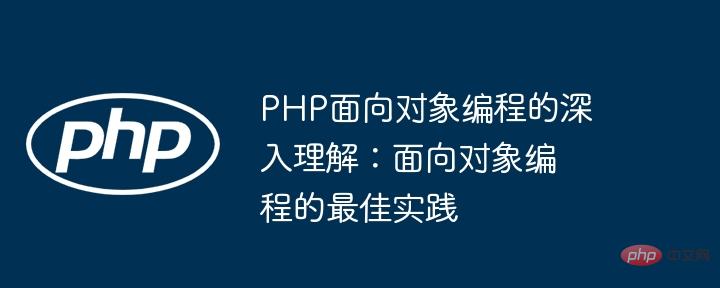
PHP best practices for object-oriented programming (OOP) include: Encapsulation: Protecting the internal implementation to ensure that objects are not affected by external changes. Inheritance: allows subclasses to inherit the properties and methods of parent classes, promoting code reuse. Polymorphism: Supports objects of different classes to respond to the same interface and implement common operations. Dependency injection: Decouple object dependencies to improve testability and maintainability.

Best Practices in Object-Oriented Programming (OOP): An In-Depth Guide to PHP
Object-Oriented Programming (OOP) is a Programming paradigm widely used in software development. It provides powerful tools for organizing and structuring code, improving maintainability and reusability. This article will take a deep dive into OOP best practices in PHP and share practical examples to demonstrate its application in real-world projects.
1. Encapsulation: Protecting internal implementation
Encapsulation refers to hiding data and methods inside classes and objects. Private properties can only be accessed from within the owning class, while public methods provide controlled access. This ensures that the object's internal implementation is not affected by external changes.
class User {
private $name;
public function getName() {
return $this->name;
}
}2. Inheritance: Reuse code
Inheritance allows one class (subclass) to inherit the properties and methods of another class (parent class). This helps reuse code and establish object hierarchies.
class Admin extends User {
public function createPost() {
// ...
}
}3. Polymorphism: Implementing a common interface
Polymorphism allows objects of different classes to respond to the same interface, such as through public methods. This makes it easier to write code that performs common operations on different types of objects.
interface Printable {
public function print();
}
class Article implements Printable {
public function print() {
// ...
}
}
class Comment implements Printable {
public function print() {
// ...
}
}4. Dependency injection: Decoupling dependencies
Dependency injection is a design pattern that injects the dependencies of an object into its constructor. This helps decouple objects, making them easier to test and maintain.
class UserController {
private $userRepo;
public function __construct(UserRepository $userRepo) {
$this->userRepo = $userRepo;
}
// ...
}Practical case: User management
In the user management system, OOP best practices can be used:
The above is the detailed content of In-depth understanding of object-oriented programming in PHP: Best practices in object-oriented programming. For more information, please follow other related articles on the PHP Chinese website!